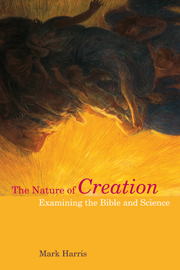Book contents
- Frontmatter
- Contents
- Preface
- Abbreviations
- 1 Introduction
- 2 Creation According to Modern Science
- 3 Creation According to the Bible I: Genesis
- 4 Creation According to the Bible II: The Creation Motif
- 5 The Framework of Biblical Cration
- 6 Creator–creation: How can a Ralationship be Described?
- 7 The Fall
- 8 Suffering and Evil
- 9 Scientific Eschatology and New Creation
- 10 Conclusions
- Bibliography
- Index of Ancient Citations
- Index
7 - The Fall
- Frontmatter
- Contents
- Preface
- Abbreviations
- 1 Introduction
- 2 Creation According to Modern Science
- 3 Creation According to the Bible I: Genesis
- 4 Creation According to the Bible II: The Creation Motif
- 5 The Framework of Biblical Cration
- 6 Creator–creation: How can a Ralationship be Described?
- 7 The Fall
- 8 Suffering and Evil
- 9 Scientific Eschatology and New Creation
- 10 Conclusions
- Bibliography
- Index of Ancient Citations
- Index
Summary
SCIENTIFIC CHALLENGES
The previous two chapters have explored the scientific and theological frameworks of the biblical creation texts. In this we have said very little about J, the Yahwist's creation story (Gen. 2:4b-3:24). But such has been the importance of this text in the relationship between science and religion since Darwin's Origin of Species that it deserves its own chapter.
It is commonplace to hear biblical scholars and theologians refer to the story of Adam and Eve in the garden as “myth” (see, for example, Deane-Drummond 2009: 221). Certainly, modern evolutionary biology sees no historical credence in J's teaching that the first man emerged fully formed at the very beginning, even before the creation of other animals and plants. The modern scientific view of humans sees their appearance on earth as extremely recent, coming at the end of a tortuous evolutionary chain of developing life spanning hundreds of millions of years. On the other hand, many conservative Christians insist that it is vital to retain a basic historicity: “A historical Fall is a non-negotiable article of faith” (Blocher 2009: 169).
Information
- Type
- Chapter
- Information
- The Nature of CreationExamining the Bible and Science, pp. 131 - 146Publisher: Acumen PublishingPrint publication year: 2013
